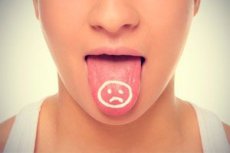Medical expert of the article
New publications
Dry mouth
Last reviewed: 06.07.2025

All iLive content is medically reviewed or fact checked to ensure as much factual accuracy as possible.
We have strict sourcing guidelines and only link to reputable media sites, academic research institutions and, whenever possible, medically peer reviewed studies. Note that the numbers in parentheses ([1], [2], etc.) are clickable links to these studies.
If you feel that any of our content is inaccurate, out-of-date, or otherwise questionable, please select it and press Ctrl + Enter.

Causes dry mouth
The feeling of dryness can be caused by the following reasons:
- Poisoning of the body, intoxication with food and alcohol products, resulting in dehydration of the mucous membrane of the larynx and mouth.
- Drug intoxication, including narcotic intoxication.
- Impaired respiratory function – snoring, blocked nasopharynx, atony of the soft palate, resulting in dry mouth.
- Nicotine poisoning, when the oral mucosa comes into intensive contact with the tarry substances of tobacco. In addition, nicotine narrows the microcapillaries of the salivary glands, as a result - salivation decreases.
- Diarrhea: General dehydration leads to a feeling of dryness.
- Diabetes.
- Endocrine diseases.
- Dyskinesia of the biliary tract.
- Low hemoglobin levels, all types of anemia.
- Arthritis, arthrosis.
- High blood pressure.
- Parkinson's disease is a degenerative disease.
- Sjogren's syndrome is an autoimmune pathology of connective tissues, their dystrophic degeneration.
- Elevated body temperature, feverish conditions.
- Epidemic parotitis (mumps).
- Dental diseases (caries, periodontal disease).
- Vomit.
- Traumatic brain injury.
- Mikulicz disease is a secondary disease, the symptom of which is lymphocytic tumors of the glands of the oral cavity.
- Surgical removal of the salivary glands.
- Consequence of chemotherapy.
- Age-related changes in the salivary glands (old age).
- Dehydration due to intense physical activity.
Dry mouth, accompanied by dizziness, fever, and nausea, is a secondary sign of a serious illness that requires a comprehensive examination and medical care.
Dry mouth has a medical definition - xerostomia. Lack of saliva, which helps to chew food, counteracts bacteria on the teeth and in the mucous membrane, neutralizes acids, can indicate the development of a disease or show temporary dysfunction of an organ or system as a result of intoxication.
Dry mouth that lasts for a long time can provoke an erosive process in the mucous membrane, as a result - secondary ones may join. The first stage of dryness, as a rule, is not noted as uncomfortable, a person simply does not pay attention to dry mouth, considering it a temporary phenomenon. The peculiarity of the second stage is decompensation of the salivary glands, dryness already causes a lot of unpleasant sensations, often interferes with talking and even eating. Signs of xerostomia are also visible on the mucous membranes of the mouth, they acquire a pale shade. The pathological stage of xerostomia is characterized by almost complete suppression of the function of the salivary glands, dry mouth becomes permanent, causing quite severe pain. As a rule, glossitis (inflammation of the tongue), periodontosis and stomatitis join dryness as concomitant pathology. The mucous membrane is covered with erosive foci. Additional signs of xerostomia include an unpleasant odor and difficulty swallowing not only food but also liquids.
Who to contact?
Treatment dry mouth
Dry mouth can be eliminated symptomatically, since xerostomia is not a separate nosological entity; rather, it is a secondary disease that accompanies the main pathological process.
First of all, a comprehensive sanitation of the oral cavity is carried out – elimination of dental diseases and damage.
A gentle rinse is prescribed to moisturize the dehydrated oral mucosa. Solutions are prepared at home, or pharmacy preparations made extemporaneously are purchased. You can independently prepare a mixture of olive oil with the addition of sea buckthorn oil.
Rinsing with tinctures containing alcohol and anti-inflammatory extracts (calendula tincture, St. John's wort tincture) is prescribed. These products are intended to activate the process of salivation. Rinsing is done 20-30 minutes before eating.
Preparations containing retinol – vitamin A – are prescribed. Retinol-containing preparations have a wound-healing effect, and they also activate local immunity.
Physiotherapeutic procedures are prescribed – electrophoresis, galvanization (exposure to electric current of a given frequency on the salivary glands).
Cholinergic drugs are prescribed locally - pilocarpine, galantamine.
Dry mouth can also be reduced by regularly drinking small amounts of liquid. If the patient prefers to drink water, it is better to choose non-carbonated mineral water or purified, filtered water. Herbal infusions have proven themselves well - chamomile, calendula, a decoction of sea buckthorn leaves or berries. Despite the fact that orange or apple juice contains acids, their use is also indicated as an additional treatment. All juices containing acid activate the process of salivation. In addition, the patient should exclude solid food, dry foods, salty and sweet dishes from the diet. And moderately spicy food, on the contrary, helps to eliminate dry mouth, since spices, especially hot peppers, contain capsaicin (an alkaloid), which provokes the secretion of saliva.
Dry mouth can be treated if the underlying cause is identified and the triggering factor is eliminated.


 [
[